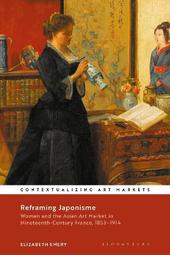
|
Reframing Japonisme: Women and the Asian Art Market in Nineteenth-Century France, 1853-1914
Paperback / softback
Main Details
| Title |
Reframing Japonisme: Women and the Asian Art Market in Nineteenth-Century France, 1853-1914
|
| Authors and Contributors |
By (author) Elizabeth Emery
|
| Series | Contextualizing Art Markets |
|---|
| Physical Properties |
| Format:Paperback / softback | | Pages:280 | | Dimensions(mm): Height 234,Width 156 |
|
| Category/Genre | Art: the financial aspect
Oriental art
Art and design styles - c 1800 to c 1900 |
|---|
| ISBN/Barcode |
9781350282766
|
| Classifications | Dewey:709.034 |
|---|
| Audience | | Tertiary Education (US: College) | |
|---|
| Illustrations |
13 colour and 48 bw illus
|
|
Publishing Details |
| Publisher |
Bloomsbury Publishing PLC
|
| Imprint |
Bloomsbury Visual Arts
|
| Publication Date |
2 June 2022 |
| Publication Country |
United Kingdom
|
Description
Japonisme, the 19th-century fascination for Japanese art, has generated an enormous body of scholarship since the beginning of the 21st-first century, but most of it neglects the women who acquired objects from the Far East and sold them to clients or displayed them in their homes before bequeathing them to museums. The stories of women shopkeepers, collectors, and artists rarely appear in memoirs left by those associated with the japoniste movement. This volume brings to light the culturally important, yet largely forgotten activities of women such as Clemence d'Ennery (1823-98), who began collecting Japanese and Chinese chimeras in the 1840s, built and decorated a house for them in the 1870s, and bequeathed the "Musee d'Ennery" to the state as a free public museum in 1893. A friend of the Goncourt brothers and a 50-year patron of Parisian dealers of Asian art, d'Ennery's struggles to gain recognition as a collector and curator serve as a lens through which to examine the collecting and display practices of other women of her day. Travelers to Japan such as the Duchesse de Persigny, Isabella Stewart Gardner, and Laure Durand-Fardel returned with souvenirs that they shared with friends and family. Salon hostesses including Juliette Adam, Louise Cahen d'Anvers, Princesse Mathilde, and Marguerite Charpentier provided venues for the discussion and examination of Japanese art objects, as did well-known art dealers Madame Desoye, Madame Malinet, Madame Hatty, and Madame Langweil. Writers, actresses, and artists-Judith Gautier, Therese Bentzon, Sarah Bernhardt, and Mary Cassatt, to name just a few- took inspiration from the Japanese material in circulation to create their own unique works of art. Largely absent from the history of Japonisme, these women-and many others-actively collected Japanese art, interacted with auction houses and art dealers, and formed collections now at the heart of museums such as the Louvre, the Musee Guimet, the Musee Cernuschi, the Musee Unterlinden, and the Metropolitan Museum of Art.
Author Biography
Elizabeth Emery is Professor of French at Montclair State University, USA.
ReviewsAs Japonisme studies grow, Elizabeth Emery's Reframing Japonisme will gain adherents owing to the meticulous way the author has researched the field to open new insights on women's role in promoting Japanese art and culture. Her detailed detective work demonstrates that women increased the availability of Japanese objects as they established collections and museums. This pioneering book will be used for years to come by those involved in expanding the parameters of the Japonisme movement in France. * Gabriel P. Weisberg, Professor Emeritus, University of Minnesota, USA and Managing Editor, Journal of Japonisme * Emery unearths references new even to specialist scholars and her analysis of familiar images and texts reveals new, and completely compelling, insights. This book will fundamentally change the study of Japonisme. It is a huge accomplishment. * Christopher Reed, The Pennsylvania State University, USA and author of Bachelor Japanists: Japanese Aesthetics and Western Masculinities * Reframing Japonisme's aim is to credit Gisette for her considerable, if unusual, success as a collector and thereby revitalize the story of japonisme and Japanese art collecting in the 19th century. Its tight storytelling and dissection of myopic narratives embedded in historical canons make the truism that "women's history is just history" apply just as much to the art world as anywhere else. * Asian Review of Books * "Through inexhaustible detective work [...] Emery brings new perspectives to light that convincingly allow her to reframe Japonisme and the nature of the Asian art market in nineteenth-century France [in] an important and eye-opening contribution to the history of Japonisme and gender studies." * Helena Kaberg, Journal of Design History *
|